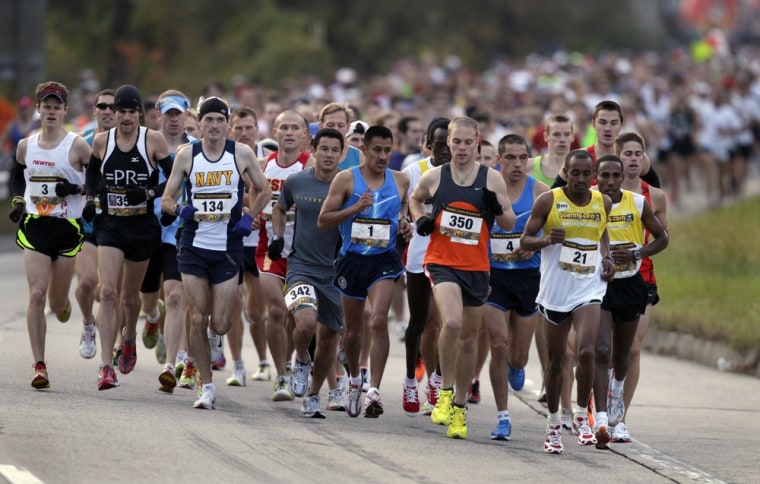It's a sad headline we've grown accustomed to seeing in the hours after many popular long-distance races: a runner collapses and dies of cardiac arrest, often heart-breakingly close to the finish line. Just this fall, a 35-year-old man died while running the Bank of America Chicago Marathon Oct. 9; a 37-year-old man died Oct. 30 at the Dodge Rock 'n' Roll Los Angeles half-marathon; and two men -- one 21, the other 40 -- died at the Philadelphia Marathon on Nov. 20.
But according to a new study examining 10 years of marathon and half-marathon races in the U.S., the risk of cardiac arrest in long distance races is actually quite rare. (It's kind of like the plane crash effect: Both events, while undeniably tragic, are reported so widely precisely because they're so rare.)
The report, just published online in the New England Journal of Medicine, examined the number of cardiac arrest cases in runners participating in marathons and half marathons in the U.S. from Jan. 1, 2000, to May 31, 2010. Of the 10.9 million runners, 59 suffered cardiac arrest.
In other words, "marathons and half-marathons are associated with a low overall risk of cardiac arrest and sudden death," write the study authors, a team led by Dr. Aaron Baggish, a Massachusetts General Hospital cardiologist. Cardiac arrest, by the way, is different from a heart attack. It happens when an arrhythmia, or abnormal heartbeat, causes the heart to stop beating -- and it can cause death within minutes if the person doesn't receive medical attention.
"This is a pretty careful study, and it starts to give some more insight into who those people are," says Dr. Paul Thompson, a cardiologist at Hartford Hospital in Hartford, Conn., who assisted Baggish with the report and has studied the link between running and heart problems. (He has, oh, just a smidge of experience with marathons himself: In 1972, he qualified for the U.S. Olympic Marathon Trials in Eugene, Ore., and four years later, he finished 16th in the Boston Marathon.)
Those who suffer cardiac arrest during a long-distance run are more likely to be men, particularly older men. In fact, 51 out of those 59 recorded cases were in men. (In the general population, cardiac arrest affects men about twice as often as women.) And most of them had some sort of underlying, perhaps undiagnosed, heart issue -- most often, hypertrophic cardiomyopathy, a condition marked by a thickening of the heart muscle, which makes it harder for the heart to pump blood.
But the rate of cardiac arrest in marathons, while low, is increasing: The study found 0.71 cases per 100,000 runners from 2000 to 2004, compared to 2.03 per 100,000 from 2005 to 2010. Of course, that's likely because of the transformation the marathon has undergone in the last 10 years, from something only an elite athlete would ever attempt -- to an item that might even appear on the average American couch potato's bucket list.
For example, in 2010, approximately two million Americans ran in full or half-marathons -- compared to less than one million who raced those distances in 2000. And by looking at the average finish times in some of the country's most popular races -- like the Chicago Marathon, which had 45,000 participants in 2011 -- it becomes clear that more casual runners are now participating: At this fall's race, the average finish time was 4:40:34, which is almost 20 minutes more than 2000's average finish time of 4:21:46.
"Unlike professional athletes that go through a very rigorous screening process -- you don't have that kind of screening before training for a marathon or half marathon. You can just start," says Dr. Kousik Krishnan, a cardiologist at Rush University Medical Center in Chicago who specializes in cardiac electrophysiology and sudden death -- and has run 10 marathons since his first in 2003.
Thompson explains that one of the big debates among cardiologists is whether everyone who wants to run a marathon should be given an exercise stress test, to screen each person for underlying heart condition -- like hypertrophic cardiomyopathy. Often, the answer is "no," because such tests can come back with false positives. "But this study suggests that it may be useful in people who are going to run marathons," Thompson says.
Have you run a full or half marathon -- or are you training for your first one now? What made you want to attempt it? Tell us what motivates you to keep running on our Facebook page. If your story inspires us, it might appear in an upcoming TODAY.com post!
Related:
